The CRKN Researcher Council (Council) provides advice and recommendations to the CRKN Board of Directors as CRKN prepares large scale, multidisciplinary funding applications (e.g., a CFI innovation Fund application) that will support a world-class research platform that enables transformational research and discovery of cultural and heritage content.
The Council also provides recommendations to the CRKN Board of Directors and other standing committees to ensure that CRKN’s heritage tools and services are driven by researcher priorities and needs. The Council ensures that new enhancements to the Canadiana platform enable research and increase the use of the Canadiana collection as research data.
The Council is established by and reports to the CRKN Board of Directors pursuant to section 12 of the Corporation’s By-laws. Additionally, the Council may provide advice and recommendations to the Preservation and Access Committee as needed.
Member

Susan Brown is Canada Research Chair in Collaborative Digital Scholarship and Professor of English at the University of Guelph. She engages from an intersectional feminist perspective with critical infrastructure studies and the use of semantic technologies for cultural scholarship through the Orlando Project in women’s literary history. Her work explores how online systems for creating, enhancing, and sharing cultural knowledge can support priorities such as collaborative knowledge production, diversity and inclusivity, respectful data creation and dissemination, sustainable access to cultural scholarship, and best practices in research data management and preservation. She directs the multi-institutional Canadian Writing Research Collaboratory platform and the Linked Infrastructure for Networked Cultural Scholarship cyberinfrastructure project. At Guelph, she runs with colleagues an interdisciplinary major in Culture and Technology Studies and The Humanities Interdisciplinary Collaboration (THINC) Lab. She is the President (2022-23) of the governing board of the international Alliance of Digital Humanities Organizations.
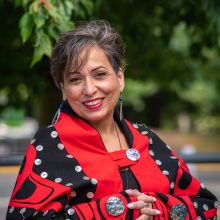
Camille Callison, Tahltan Nation member, is the University Librarian at the University of the Fraser Valley (UFV) and a passionate cultural activist pursuing a PhD in Anthropology at the University of Manitoba. Her research critically examines the relationship between cultural memory institutions and the continued survival and activation of Indigenous knowledges, languages, and cultures. As part of her current professional contributions, Camille serves as the Chair of the National Indigenous Knowledge and Language Alliance (NIKLA) and IFLA Professional Division H, as well as on the Board of Directors of the Canadian Research Knowledge Network (CRKN), and as a member of IEEE P2890™ Recommended Practice for Provenance of Indigenous Peoples’ Data, OCLC Reimagine Descriptive Workflows Advisory Group, NISO Diversity, Equity, & Inclusion subcommittee and the Canadian Truth and Reconciliation Commission Taskforce on Archives. She is committed to being part of creating meaningful change related to equity, diversity, and inclusivity in the library, archival and cultural memory professions.

Stacy Allison-Cassin is a Citizen of the Métis Nation of Ontario with strong kinship connections to the Georgian Bay Métis community and through the historic North-West. An Assistant Professor at the School of Information Management at Dalhousie University, Stacy engages in work and research related to Indigenous matters in libraries and the wider cultural heritage sector. Stacy is a passionate advocate for change in information structures and metadata systems within the library profession. She is the Chair of the International Association of Library Associations Indigenous Matters Standing Committee and the community chair for the Language Preservation and Instruction community and a member of Council of the National Indigenous Knowledge and Language Association, and Indigenous-led association centred in Canada and also sits a number of other advisory bodies. Stacy also has extensive professional experience as a librarian, serving in a variety of roles in the libraries at York University.
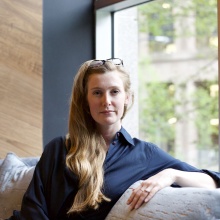
Dr. Alyssa Arbuckle is the Associate Director of the Electronic Textual Cultures Lab (ETCL) at the University of Victoria, where she is Operational Lead for the Implementing New Knowledge Environments (INKE) Partnership and a co-facilitator of its Connection cluster, as well as a Co-Director of the Digital Humanities Summer Institute (DHSI). Alyssa also holds an Interdisciplinary PhD from the University of Victoria, focusing on open social scholarship and its implementation. Currently, she explores open access, digital publishing, and how we can share academic research more broadly. To this end, Alyssa’s work has appeared in Digital Studies, Digital Humanities Quarterly, KULA: Knowledge Creation, Dissemination, and Preservation Studies, and Scholarly and Research Communication, among other venues, and she has co-edited print and online book collections titled Social Knowledge Creation in the Humanities and Feminist War Games?: Mechanisms of War, Feminist Values, and Interventional Games.
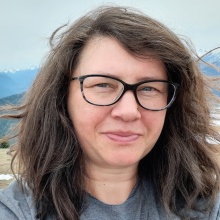
Camie Augustus is a Professor in the Department of Indigenous/Xwulmuxw Studies at Vancouver Island University. As a historian and former land claims researcher, and as a professor in a teaching-focused institution, she is passionate about student, community, and public access to heritage and archival content, including its digitization. As an interdisciplinary researcher, her work considers a range of topics, including colonialism and reconciliation, government policy, race and racism, autoethnography, Indigenous community healing initiatives, and nature therapy. Her current work considers Indigenous reconciliation in the context of public parks and their histories.
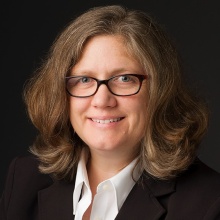
Dr. Jennifer Bain is a Professor of Musicology and Associate Vice President Research at Dalhousie University. She directs the Digital Analysis of Chant Transmission (DACT) network, funded through a SSHRC Partnership Development Grant. Her publications focus on the development of digital chant research tools and the reception and analysis of medieval music including the music of Guillaume de Machaut and Hildegard of Bingen. Named to the Royal Society of Canada's College of New Scholars, Artists, and Scientists, she has received numerous grants from the Social Sciences and Humanities Research Council of Canada and holds a Digital Research Alliance research platforms and portals allocation to host digital repositories and databases on medieval music.
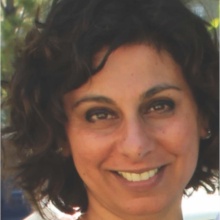
Sabeen bin Zayyad has a PhD in Environmental Design and is currently a Visiting Scholar with the School of Architecture, Planning and Landscape at the University of Calgary.
With research focused on the Arab Gulf region, Sabeen has published papers on the impact of architectural and urban developments on the cities of the Gulf and the notion of smart cities in the region. Her interdisciplinary research addresses the disconnect between Western-inspired and vernacular designs and how they contribute to and shape the architectural and urban development of cities in the Arab Gulf region through contextual frameworks. Other research interests also include the promotion of smart cities in the region, the use of heritage as a platform for socio-economic development and the documentation and preservation of the built environment.
Sabeen has also served as a member of the new urban agenda committee with the Canadian Institute of Planners and as a peer-reviewer on post-secondary learning and teaching.

Dan Brown is Professor of Computer Science at the University of Waterloo, where he has been a faculty member since 2000. He earned his S.B. in mathematics with computer science from MIT, and his PhD in computer science from Cornell. He was a Research Scientist at the MIT/Whitehead Institute Center for Genome Research (now the Broad Institute), working on the human and mouse genome projects.
His research is alarmingly multidisciplinary, ranging from developing algorithms to build evolutionary trees and analyze genomic sequences to computationally characterizing rap artists by their rhyming style to analyzing the meaning of “diverse” to music listeners to building computational poets inspired by the news. He’s always looking for the next fun thing to work on.
Dan has also served in a number of administrative roles at Waterloo, from running his School’s 3500-student undergraduate program to being president of the faculty association for the 2020-2021 pandemic year.
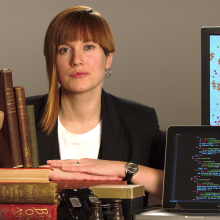
Constance Crompton (she/her) is a white, queer, able-bodied settler and a Canada Research Chair in Digital Humanities. She directs the University of Ottawa’s Labo de données en sciences humaines/The Humanities Data Lab. She is a member of the Lesbian and Gay Liberation in Canada, Transgender Media Portal, Linked Infrastructure for Networked Cultural Scholarship, and Implementing New Knowledge Environments Partnership research teams. She serves as board member of the Text Encoding Initiative. She is the co-editor of two volumes, Doing Digital Humanities and Doing More Digital Humanities (Routledge 2016, 2020). She lives and works on unceded Algonquin land.
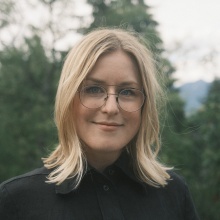
Rebecca Dickson is a Librarian, Technologist, and the Digital Preservation Coordinator for the Council of Prairie and Pacific University Libraries (COPPUL). Her current work focuses on building capacity for Academic Libraries to provide sustainable, community-centered access to digital collections with value for research, teaching, and cultural heritage. She collaborates with regional, national, and international partners to develop services, strategies and infrastructure that ensure digital assets remain available and usable for the long term. She holds a Master of Library and Information Studies (MLIS) from the University of British Columbia, where she previously held a number of roles in the Library’s Digital Initiatives unit. She brings experience developing technical solutions that enable innovative discovery and use of digital objects and metadata, and a user-centered design orientation that stems from an academic background in mixed-methods social science research.
Rebecca also serves as a member of the Canadian Association of Research Libraries Digital Preservation Working Group, and as Co-Chair of the Digital Research Alliance of Canada’s Preservation Expert Group. She is grateful to live and work as an uninvited guest on the traditional, ancestral, and unceded territory of the Musqueam, Squamish, and Tsleil-Waututh First Nations.

Maxime Gohier is professor of history at Université du Québec à Rimouski (UQAR) and a specialist in First Nations history. His research focuses in particular on the relations between the Native peoples of the American Northeast and the State (French and British colonial, then Canadian), as well as on the place and role of the written word and the archive in the structuring of these relations. Since 2019, he has been directing Nouvelle-France numérique (Digital New France), a partnership and collaborative project that studies the mechanisms of documentary production and its networks of actors in New France. Exploiting the Handwritten Text Recognition (HTR) technology, the project also seeks to develop new practices for managing archival research data, in order to facilitate their large-scale sharing and to enable the use of digital technologies in the analysis of documentary heritage. Over the past three years, this project has developed the first efficient public recognition models adapted to 17th and 18th century French manuscripts. It also trained numerous researchers in the humanities and social sciences, students and professionals in the conservation of documentary heritage (archivists and librarians) in handwriting recognition software.
A member of the Centre Interuniversitaire de Recherche sur la Première Modernité (CIREM 16/18) and of the Regroupement des chercheurs en patrimoine de l'UQAR (ARCHIPEL), he is also associated with the projects Donner le goût de l'archive à l'ère numérique, Écrire l'Amérique dans le Mercure galant and Les collections du Séminaire de Québec : cerceau de la civilisation canadienne. In collaboration with these different projects teams, Maxime Gohier has organized the first edition of the Summer School on Digital Culture and Research Data Management as well as the History and Digital Culture workshop, both held in Rimouski in June 2022 on the theme "Maritime New France".

Jane Griffith is an assistant professor in the School of Professional Communication at Toronto Metropolitan University, where she teaches writing. She is the author of the award-winning book Words Have a Past: The English Language, Colonialism, and the Newspapers of Indian Boarding Schools (University of Toronto Press). She has researched archives and settler colonialism, and currently holds a SSHRC Insight Grant in support of research for her second book on the histories of professional communication, public relations, and hydroelectricity. Jane is a past Fulbright scholar.
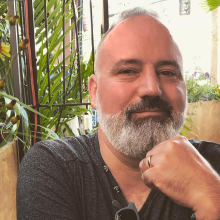
Jeremy Heil has been the Digital and Private Records Archivist at Queen’s University Archives since 2001. He holds a Master of Archival Studies degree from the University of British Columbia (2000). Prior to working at Queen’s, he was employed as an archivist with the Chung Collection in Vancouver, and in the Private Records Section of the Provincial Archives of Alberta. He has served on numerous committees locally, provincially, and nationally, including terms as President of the Archives Association of Ontario and as Managing Editor of Archivaria. He has taught workshops on digital records and metadata in archives and presented papers on various topics related to digital archives over the past 20 years. He is a collaborator with the Vulnerable Media Lab at Queen’s University, as well as with the Queen’s Wicked Ideas-funded project “Will Digital Art Have a Digital Future?: The Challenges of Preserving and Restoring Digital Born Cultures.” He recently completed his term as Co-Chair of the National Archival Appraisal Board Ad Hoc Committee for the Monetary Appraisal of Electronic Records, which resulted in the report Dollars for Digital: Evaluating Strategies for the Monetary Appraisal of Digital Content in Archival Donations. He continues to research on the challenges relating to the monetary appraisal of digital records.
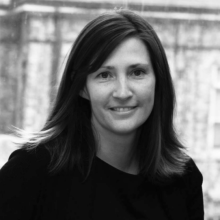
Kim Martin is an Assistant Professor in History at the University of Guelph where she co-created and teaches in the new Culture & Technology Studies Program. She is the Research Board Chair for Linked Infrastructure for Networked Cultural Scholarship (LINCS), a role which sees her investigating the user-experience of interfaces for humanities research. Kim holds a PhD in Library and Information Science from the University of Western Ontario and was the Michael Ridley Postdoc in Digital Humanities from 2016-2019. Her research interests include the role of serendipity in digital information-seeking; local, oral history; gender and technology; DH and collaboration; and interfaces for working with linked data. Recent articles about Kim’s work can be found in KULA, Cataloging & Classification Quarterly, and the Canadian Historical Review.
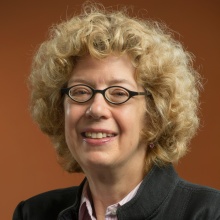
Sheila Petty is professor of media studies and SaskPower Research Chair in Cultural Heritage at the University of Regina. A Fellow of the Royal Society of Canada, she has written extensively on issues of cultural representation, identity and nation in African and African diasporic screen media, and has curated film, television and digital media exhibitions for art galleries across Canada. She is author of Contact Zones: Memory, Origin and Discourses in Black Diasporic Cinema, and co-editor of the Directory of World Cinema: Africa. Her research program focuses on manifestations of cultural heritage in screen media, especially sub-Saharan African, North African and Amazigh cinemas. Her latest project, funded through New Frontiers in Research Fund, investigates methodologies for decolonizing film festival research in a post-pandemic world. She is currently completing a book on Algerian feminist filmmaker, Habiba Djahnine (Edinburgh University Press).
